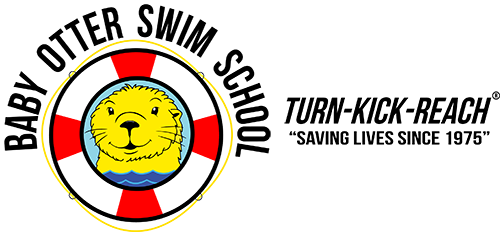Baby Otter Swim School offers a variety of private swim lessons to fit your level of experience. From infants to adults we can teach you how to swim!
Turn, Kick, Reach® (TKR): A unique five consecutive day program to teach children, as soon as they can crawl, what to do if they fell into the water.
TKR Review: Designed to assist swimmers who have taken the TKR private class, but still need strengthening and improvement on the skills taught.
Beginning Strokes, Level 1: Designed for swimmers who have had some experience in the water. Swimmers learn the log roll, how to float, use their arms and dive for toys.
Beginning Strokes, Level 2: Designed for swimmers who have completed level 1. Swimmers learn the breast stroke and rhythmic breathing for freestyle.
Beginning Strokes, Level 3: Designed for swimmers who have completed level 2. Swimmers learn the side stroke, elementary backstroke, backstroke, treading water and survival technique.
Adult: Private classes designed to teach adults who have never learned to swim and for those adults who want to improve.
Your child will learn to hold their breath, put their face in the water, and swim both to the steps and wall of the pool. The final stage is learning what to do if they fall into a body of water; they learn to turn back to where they fell in, kick their feet, reach for the edge or steps, and climb out.
We have been successful because we teach with tender loving care and great patience; we are consistent and persistent, we build their skills on a gradual basis in the 5 days so the child becomes comfortable and confident in the water. The one on one is the best way for their first experience in the water. The system has proven itself over and over again for 40 years.
We will begin instruction as early as nine months of age, although it is never too late to start. As soon as a child can crawl, they need to know how to swim. Statistics reveal that children under the age of 3 do drown and need to develop skills to increase their chances of survival should an incident occur. We teach children of all ages about water safety and provide swim programs designed for adults.
Drowning is the #1 cause of death for children ages 1 to 4 in Florida.
75% of victims are ages 12 to 25 months old.
65% drown in the family pool.
33% drown in a neighbors’ or relatives’ pool.
For every child that drowns, 4 are hospitalized for near non-fatal drowning.
77% were missing less than 5 minutes.
Our program is state and nationally certified equivalent to the American Red Cross and YMCA. We have a professional team of positive, loving instructors committed to solving childhood drowning. It is always a good idea to choose a licensed program with a proven system for success. We have been saving lives for decades.
It is essential that until your child is going to learn strokes, you never allow them to blow bubbles. The reason for this is that their lungs act as balloons and help keep them afloat. Blowing the air out and making bubbles will cause them to sink, making it harder for them to try and save themselves.
Ask questions when interviewing different swim schools. See if they are certified, are they insured, how much experience they have had teaching the age group of your child and what age groups do they teach? Are classes offered for private lessons and group lessons? Which method is the parent comfortable with for their child? Is it really more expensive when other school’s charge monthly UNTIL your child swims? What does that mean in dollars and time?
Baby Otter Swim School believes that a child’s first experience in the water should be private lessons. This one-on-one instruction gives full attention to your child and their needs. We know that a child may cry at first during their lessons because we are strangers, they are in a strange place and the idea of being in the water is very new to them. We love them through it using positive reinforcement and loving words. The personalized attention given to your child is vital for their first introduction to the water.
Your child’s instructor should have more than a lifeguard certification. The instructor should have a national certification where they have learned the proper techniques to teach swimming or water safety. Baby Otter Swim School has its own state and national certification. Our Turn, Kick, Reach (TKR) program teaches a child to save themselves if they should fall into the water. After that, we start teaching beginning strokes and many more advanced levels all the way to the swim team. The instructor should also be certified in CPR. At Baby Otter our instructors are trained through our nationally certified program and are lifeguards as well.
As our philosophy states, we highly recommend private swim lessons for your child’s first experience. After their private lessons of Turn, Kick, Reach, we suggest that you place your child in a group class with other children that have completed the TKR classes. After the TKR group class we suggest a private class in beginning strokes. We start with 5 days of level 1. Once the skills are mastered we have two additional levels. All program descriptions are listed under our program section.
You need to ask what ages they start to teach children to swim. If you have a toddler or a child that has never experienced lessons before, ask what specifically your child will learn. When you call our office and inquire about lessons we explain exactly what your child will learn. Young children under age 2 need to learn water survival and then move onto a more advanced level of swimming.
